Homeland Hospice CNA Angie Bucci: Service from the Heart
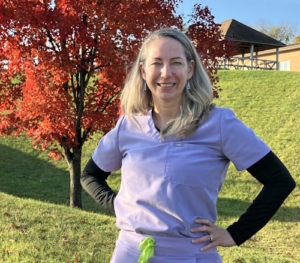 Angie Bucci of Shippensburg has a heart for hospice work. She enjoys connecting with her patients and their families to provide the most compassionate care possible. For more than 12 years she has worked as a Certified Nursing Assistant (CNA) for Homeland Hospice, a nonprofit hospice program that serves communities throughout central Pennsylvania. For Angie, her career is not about a job to do. It is an opportunity to connect with others to profoundly change a person’s life through kindness and support.
Angie Bucci of Shippensburg has a heart for hospice work. She enjoys connecting with her patients and their families to provide the most compassionate care possible. For more than 12 years she has worked as a Certified Nursing Assistant (CNA) for Homeland Hospice, a nonprofit hospice program that serves communities throughout central Pennsylvania. For Angie, her career is not about a job to do. It is an opportunity to connect with others to profoundly change a person’s life through kindness and support.
Angie joined the Homeland team after working and caring for patients in the hospital setting. While she appreciated the training she received, the pace of hospital work did not provide time to connect with individual patients and meet their direct needs. She has found Homeland Hospice to be the perfect match to her skills and interests.
“I love the one-on-one time I have with patients,” Angie says. “I feel I can truly provide the help and friendship they need.”
Over the years, Angie has gotten to know many patients well and form lasting bonds with them and their families. In her role, she spends about an hour with each person during each visit, during which she has conversations and learns what is on their minds and in their hearts.
“This work is very rewarding,” Angie adds. “It feels good to help people.”
Homeland Hospice CNAs are an integral part of the care team and often get to spend the most time with patients. They provide personal care with tasks like bathing and grooming, remind patients about medications and assist with light housekeeping. All services are customized to meet the individualized needs of patients and their families.
The role of CNAs and the importance of increasing the number of people in the profession has skyrocketed as the Baby Boomer generation ages. To help meet this need, Homeland has developed an accredited CNA training program to develop current talent at Homeland as well as recruit and train new employees for all of Homeland’s work, which includes Homeland Center, Homeland HomeHealth, Homeland HomeCare and Homeland Palliative Care.
Angie recommends that anyone who has a passion for serving others consider this path as a potential career.
“It is all about heart,” Angie says. “I love what I do.”
For more information about Homeland’s CNA training course, call (717) 221-7797.

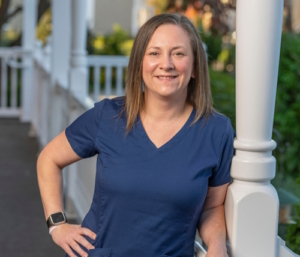 When Aimee Schmoltze’s mother began receiving hospice care, she saw the impact of the program on their family. Over a 14-month period, Aimee, her mother and their family developed emotional bonds with the hospice staff who provided compassionate care during a very difficult time. This was a formative experience for Aimee. Amidst her grief, she felt called to the work of hospice. Today, Aimee is a registered nurse and case manager for Homeland Hospice, a nonprofit hospice program that serves communities throughout Central Pennsylvania.
When Aimee Schmoltze’s mother began receiving hospice care, she saw the impact of the program on their family. Over a 14-month period, Aimee, her mother and their family developed emotional bonds with the hospice staff who provided compassionate care during a very difficult time. This was a formative experience for Aimee. Amidst her grief, she felt called to the work of hospice. Today, Aimee is a registered nurse and case manager for Homeland Hospice, a nonprofit hospice program that serves communities throughout Central Pennsylvania.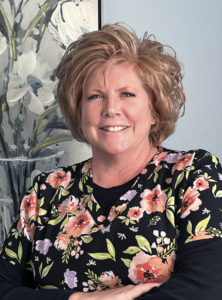 Kristine (Kris) Crockett, RN, CHPN, Director of Homeland Hospice and Homeland Palliative Care, approaches life with an open mind, always looking for opportunities to serve others. For more than 25 years, she has provided compassionate end-of-life care as a hospice nurse and administrator. The road to her current role with Homeland has been filled with gratifying experiences beginning with her service in the Army. As a proud veteran, Kris feels a special bond with the veterans served by Homeland Hospice.
Kristine (Kris) Crockett, RN, CHPN, Director of Homeland Hospice and Homeland Palliative Care, approaches life with an open mind, always looking for opportunities to serve others. For more than 25 years, she has provided compassionate end-of-life care as a hospice nurse and administrator. The road to her current role with Homeland has been filled with gratifying experiences beginning with her service in the Army. As a proud veteran, Kris feels a special bond with the veterans served by Homeland Hospice.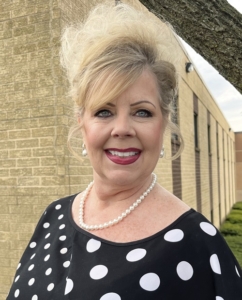 As a young woman, Tamara Jaroszewski of Harrisburg experienced the profound impact of hospice services when her sister died of breast cancer at age 40. For Tamara, hospice work became a beacon of hope and inspiration. She felt called to help patients during their end-of-life journey. Her call was recently answered when she joined Homeland’s Hospice team as the volunteer coordinator. Homeland Hospice, a nonprofit hospice program, serves communities throughout Central Pennsylvania.
As a young woman, Tamara Jaroszewski of Harrisburg experienced the profound impact of hospice services when her sister died of breast cancer at age 40. For Tamara, hospice work became a beacon of hope and inspiration. She felt called to help patients during their end-of-life journey. Her call was recently answered when she joined Homeland’s Hospice team as the volunteer coordinator. Homeland Hospice, a nonprofit hospice program, serves communities throughout Central Pennsylvania.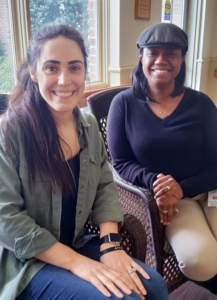 What do social workers do? At Homeland, they help families navigate the complexities that are often involved with caregiving.
What do social workers do? At Homeland, they help families navigate the complexities that are often involved with caregiving.
